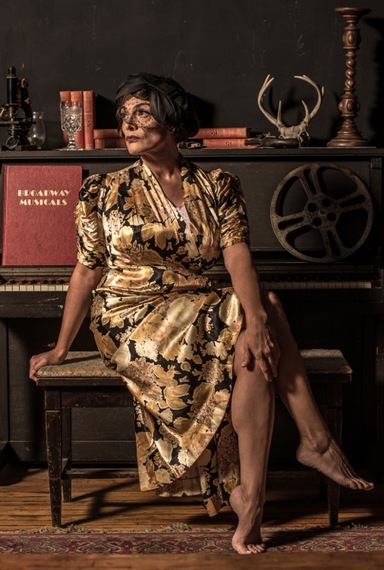
She was witty, caustic, talented and tormented. Dorothy Parker was famous for her wisecracks at the Algonquin Round Table and lauded for her poetry and short stories. In the 1920s and '30s, Parker wrote for Vanity Fair and The New Yorker, was Oscar-nominated for the screenplay A Star Is Born and had a lifelong obsession with suicide and death.
Which may explain why this insightful but often heartbroken woman suggested "excuse my dust" for her epitaph. It's an apt title for Jennifer Engstrom's moving one-woman show Excuse My Dust - A Dorothy Parker Portfolio, now off-Broadway at the SoHo Playhouse.
Assembled from five short stories, various poems and book reviews, Engstrom skillfully recreates Parker's cynical, sardonic, melancholy edge. She muses on everything from love, men and women, dancing partners and hangovers. Parker's misery is the stuff of sassy, insightful prose; her observations, such as "never trust a round garter or a Wall Street man," "she looked like someone who would eat her young" or "it's so easy to be sweet to people before you love them," underscore the writer's razor-sharp eye.
The young women in Excuse My Dust are eager, emotional, world-weary and rueful, and Engstrom recounts their social yearnings and interior landscapes with authenticity and care. Parker herself suffered a difficult childhood. Losing her parents at a young age, she turned to alcohol and writing. Eventually, the former overtook the latter, a loss to American letters.
As directed by Darren Lee Cole, Engstrom smartly captures Parker's polished voice and woeful sensibility. It's staged, in part, as an eerie last hurrah. More than most, Parker knew when the party was over. Engstrom serves Parker's literary legacy well.
While Parker was familiar with hell, The Brightness of Heaven at the Cherry Lane focuses on an Irish Catholic family in Buffalo, New York, more obsessed with salvation -- at least the older generation. It's 1974, and they see the church as the center of their social and spiritual lives. Their world, however, is rocked by Watergate, Vietnam, gay liberation and civil protests.
"Where does it get us -- all this praying and obeying?" asks daughter Kathleen (Kendall Rileigh) of her mother (Kate Kearney-Patch) and father (Peter Cormican). She, along with her cousin Jimmy (James Michael Lambert), lead the charge of progressive social issues. While brother Dennis (Mark Banik) is busy playing the good son and towing the parental line, his cousin Grace (Emily Batsford) feels depressed and trapped.
The problem is, there's no real dramatic tension until dinner, when suddenly every conceivable social taboo for a traditional Catholic family is served. While accusations of familial rejection and secrets fly fast and loose -- the pitch is strangely calm. Given that, it's hard to care about the characters. Despite their unhappiness, there is sparse emotional resonance to back their outrage.
Playwright Laura Pedersen has an interesting idea -- the older vs. younger generational gap is fertile ground -- and the issues she raises were potent fare in the explosive Seventies. She asks a provocative question: How can conventional families and rigid theologies cope with a changing world? Unfortunately, there is little sign of heaven in this set-up of earthly hell.
Photo credit: Ryan Borque
